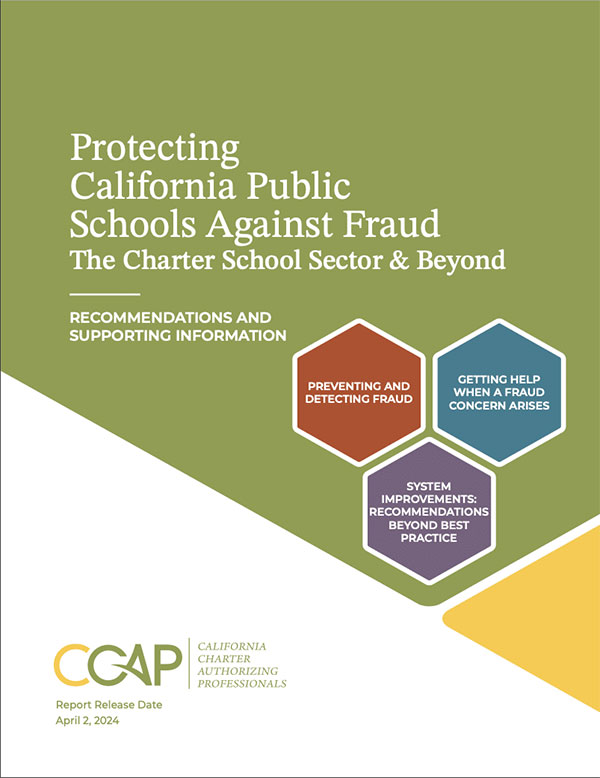Fraud Prevention
Interested in volunteering to serve on an implementation working group?
The CCAP report “Protecting California Public Schools Against Fraud” highlights the need for practical improvements to prevent and detect fraudulent fiscal activity in charter schools. Implementing these recommendations will enhance the integrity of the entire public school system in California.
Charter authorizing professionals are uniquely positioned to support the implementation of the report’s recommendations. Fourteen out of the twenty recommendations require only diligent and common-sense implementation, without needing new laws or regulations. Volunteers are needed to draft effective policies, create templates, design review systems, and support implementation efforts. Non-authorizers, especially from the charter school community, also are welcome.
CCAP is establishing eight implementation working groups and seeks volunteers to help. These groups will follow a collaborative process similar to the one used to build consensus for the Task Force’s recommendations. Each group will support the operational implementation of the report’s recommendations.
Want to Know More About the Anti-Fraud Task Force?
In January 2023, California Charter Authorizing Professionals (CCAP) convened a broad-based, statewide Anti-Fraud Task Force, with two goals: 1) to propose ways to prevent and detect fraudulent activity through the implementation of anti-fraud best practices and supports; and 2) to support more aggressive prosecution of individuals who commit fraud. After a year of fact-finding and discussions, in April 2024, CCAP released the report Protecting California Public Schools Against Fraud with 20 recommendations.

Background
Overall, California’s public education system is remarkably free from fraud and financial abuse. Considering that there are about 10,500 schools and more than 631,000 employees serving nearly 6 million students, this is a tribute to the integrity and dedication of teachers, administrators, staff, and boards of education.
The state’s public charter school sector is about 30 years old and now educates one in ten students in more than 1,300 charter schools. Generally speaking, like district public schools, charter schools have experienced relatively few instances of financial abuse.
Nonetheless, each time funds are stolen from our public schools, district or charter, it harms not only students, but also the reputation of all of public education.
Charter schools, by design, receive greater flexibility to innovate as a way to create educational options that may be more effective in meeting the educational needs of students, especially traditionally underserved students. In return for this flexibility, charter schools in California are authorized by a school district, county office of education, or, in a few remaining cases, by the State Board of Education. Authorizers are required to provide ongoing oversight of charter schools’ academic programs, financial stability, and integrity. Charter schools must demonstrate their effectiveness every two to seven years through the charter renewal process with their authorizer.
Unfortunately, the flexibility to innovate also has created some opportunities for criminals to abuse and defraud the state by falsifying documents, such as enrollment, as a way of illegally obtaining funding. The most recent high-profile case involves criminal operators of the A3 network of online charter schools, who stole millions of dollars in state education funds.
The goal must be zero tolerance for fraud or financial abuse in California’s entire public education system. The Anti-Fraud Task Force worked to strengthen and augment the capacity of charter schools and their district and county office of education authorizers to identify and prevent abuse while ensuring that all charter schools meet their fiduciary responsibilities.
Further, detection of fraud is not always easy in either school district or charter schools, so, while the Task Force focused on charter schools, the results of its work to curb and investigate fraud benefits all public schools.
A Two-Tiered Approach
Addressing the first of the two goals identified above, the first tier of the Task Force’s work was to analyze existing best practices, processes, procedures, tools, and templates that are effective at preventing fraud, as well as identifying potential warning signs or indications that fraudulent activity may, in fact, be occurring. There are high quality tools already being used by a number of authorizers, charter schools, and other key organizations such as the Fiscal Crisis and Management Assistance Team (FCMAT).
The Task Force’s Report compiles these current and new approaches into a catalogue of best practices and makes a case for their adoption by charter authorizers and charter schools throughout the state. These tools and best practices will be adaptable to the specific circumstances and contexts of individual charter schools and charter authorizers.
To address the second goal, the second tier of the Task Force Report provides recommendations on how to disseminate information in the entire public school sector so that people concerned about potentially fraudulent activity know which agencies and/or authorities have the responsibility to take concrete steps to investigate and how to report concerns to them.
To support more robust prosecution of suspected fraudulent activities, the Task Force’s Report also recommends improvements in the overall oversight system and the civil and criminal justice processes so that evidence of fraud can more readily be fully investigated, and, if warranted, prosecuted.
A Broad Working Group
The Task Force members represented a diverse cross section of professionals who share a sense of urgency in fighting fraud, including representatives from:
- Charter school authorizers (both school districts and county offices of education)
- Representatives of charter schools
- The California Fiscal Crisis & Management Assistance Team (FCMAT)
- The California District Attorneys Association (CDAA)
- Auditors
- Attorneys who represent authorizers and attorneys who represent charter schools
- Educational service providers for charter schools (i.e., back office providers)
These experts and practitioners reviewed existing reports, curated existing resources, and gathered additional input. The collaboration will continue as the recommendations are shared with the public education community and state policymakers with an eye toward supporting adopting and implementation.
The work of the Anti-Fraud Task Force was generously supported in its early stages by a grant from the Charles and Helen Schwab Foundation and is generously supported by a Charter Schools Program National Dissemination Grant from the U.S. Department of Education.
